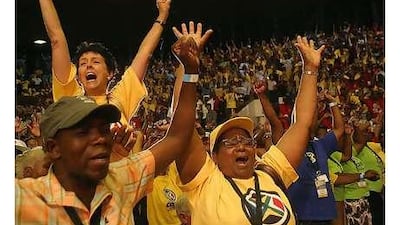BLOEMFONTEIN, South Africa // In the backstreets of Bochabela, a township south of Bloemfontein city centre, stands a decaying white building. The windows of Klein Magasa Hall are covered by metal grilles, the paint is flaking, the structure is covered in graffiti and rubbish litters the ground outside. But in 1912 it saw the formation of the South African Native National Congress, which went on to become the African National Congress, the heart of the struggle against apartheid, and for the past 14 years the country's ruling party.
Now, though, and like the building in which it was founded, the organisation is cracking. A few kilometres away, at the University of the Free State, a breakaway party was launched last week, in an atmosphere of feverish excitement for 4,000-odd delegates. The Congress of the People (Cope) is being led by Mosiuoa "Terror" Lekota, a former ANC chairman, and most of its members are renegades from the ANC.
The event could not have been more symbolic. Bloemfontein is replete with history, having hosted the creation of the National Party, which instituted apartheid, as well as that of the ANC. Moreover, Cope's founding conference culminated on Dec 16, the most important date in the Afrikaner cultural calendar, marking the anniversary of the Battle of Blood River, when Boer forces massacred the Zulus of Dingane in 1838, so many being killed that the waters of the Ncome River ran red.
In post-apartheid South Africa, the occasion is commemorated as the Day of Reconciliation, a public holiday, but the divisions within the ANC are so deep, and so bitter, that such a prospect within the party is infinitely remote. Days after he was released from 27 years of imprisonment in Feb 1990, Nelson Mandela went to the city to declare: "The ANC is a child of Bloemfontein. The umbilical cord of the ANC is buried here. Today, we are like children returning to their mother.
"We have never faltered in our quest to create a South Africa where freedom, peace, justice and equality prevail. This is the noble mission of the ANC and one which we will never forsake." With the ANC family riven by feuding, delegates at the Cope launch disagreed profoundly. Patricia Harris, 56, from Mitchells Plain in the Western Cape, said the new party had been necessary "because of the corruption of the ANC".
"What Nelson Mandela built up [the current ANC president Jacob] Zuma flushed down the lavatory and he flushed us with it, so we had to form Cope." The reality is somewhat more nuanced and complex, according to analysts. The ANC has struggled to develop from a liberation movement - which it still considers itself - to a political party, and its power structures have failed to adapt to changing circumstances.
"The biggest threat to the ANC is the ANC itself," said Allister Sparks, an author and commentator. After Mr Zuma ousted Thabo Mbeki from the party leadership one year ago, Mr Sparks pointed out, the new leadership's supporters "set about capturing control of every branch" from the 40 per cent of the party that had backed the deposed president, thereby threatening the victims' livelihoods. "The ANC has become a huge employment bureau; it's no longer an idealistic organisation," he said. "Ultimately the committees control the election lists, and these are jobs for thousands of people at national and provincial levels, thousands more at municipal level, which bring with it control of tenders and patronage.
"These are the aggrieved who quit the ANC because they were driven from it." But whatever self-interest is behind its creation, Cope offers black South Africans a plausible electoral alternative to the ANC for the first time, advancing the chances of truly competitive multiparty politics, and demonstrating the political development of the country - most post-colonial African states, which won their independence decades ago, have yet to reach it.
"Previously there was no exit option and that's one reason why the ANC leadership has been able to contain internal discontent," said Anthony Butler, professor of public policy at the University of Cape Town. "I think they are worried." And Cope has the opportunity to capitalise on deep levels of disappointment among the many South Africans who have not seen material benefits from democracy and economic growth.
Opposite Klein Magasa Hall, Eugene Jacobs sat swigging from a large bottle of Hansa beer. "We don't have work, we are always drinking, as you now see," said the 26-year-old, who has never had a job. "I blame the leaders of the ANC. When it comes to the elections they always promise people they are going to do one, two, three, create some jobs, but now I'm here. I have got a matric [the 18-year-old school leavers' qualification in South Africa] and I'm not even working. As you can see there are no tarred roads."
sberger@thenational.ae

